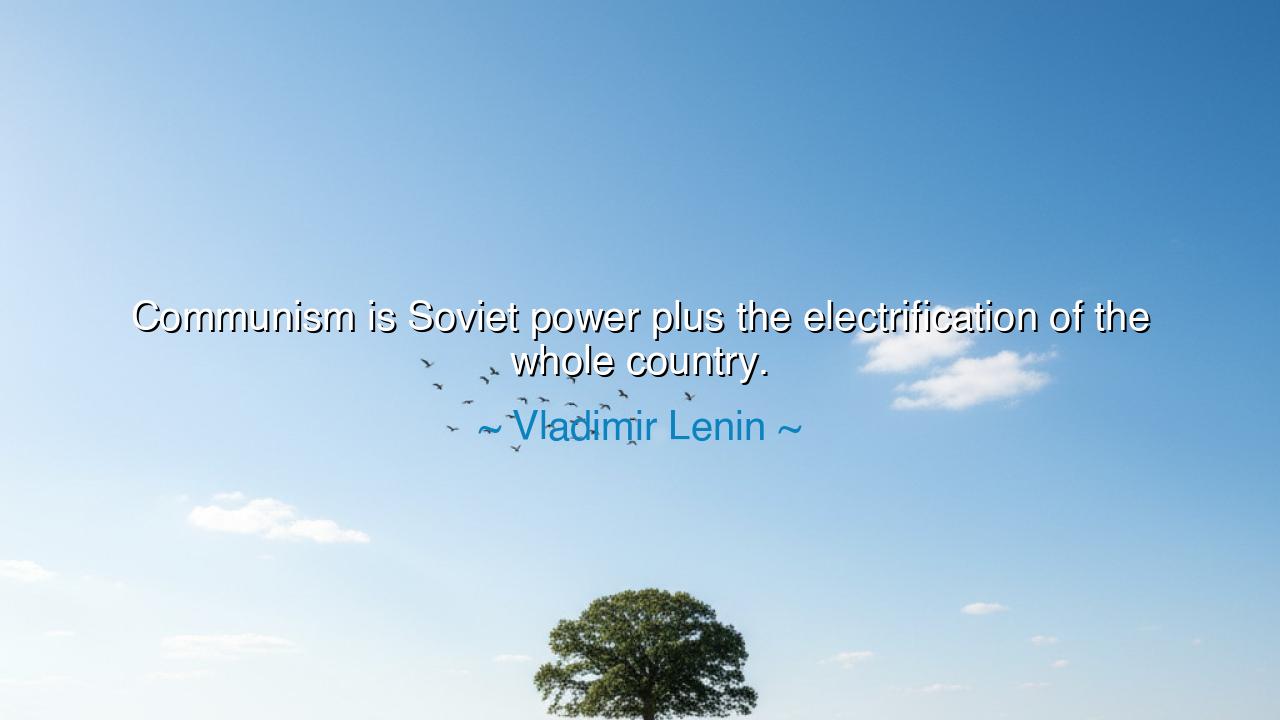
Communism is Soviet power plus the electrification of the whole






In these formidable words, Vladimir Lenin distills the essence of Communism into both political authority and material progress. He declares that it is Soviet power, the governance of the workers and peasants themselves, combined with the electrification of the whole country, the literal illumination and energizing of the land. Lenin’s vision conveys that true revolution is not merely the seizure of power, but the transformation of life itself—the harnessing of technology to serve the people and the creation of a society capable of sustaining its newfound political freedom.
The origin of this insight lies in the tumultuous birth of the Soviet state following the October Revolution of 1917. Russia, vast and impoverished, lacked basic infrastructure, and Lenin recognized that political power alone would be insufficient to achieve social transformation. Electrification became a metaphor and a practical instrument of modernity, symbolizing progress, knowledge, and liberation from backwardness. In his famous dictum, Lenin fused political ideology with pragmatic action, asserting that the two must go hand in hand to awaken the full potential of the nation.
History illustrates the profound importance of this principle. During the first Five-Year Plan, Soviet engineers and workers undertook the construction of massive power stations, factories, and transportation networks. The Dnieper Hydroelectric Station, for example, became a beacon of industrial transformation, electrifying homes, workshops, and cities, and bringing the abstract promise of revolution into the tangible world. Through these efforts, Lenin’s vision of Communism as power plus electrification moved from words into reality, demonstrating that political ideals require material foundations to flourish.
Lenin’s phrase also carries symbolic resonance. Electricity, a force invisible yet omnipresent, mirrors the transformative nature of revolutionary power: it flows through every corner of society, energizing thought, labor, and culture. Without the light of electrification, the authority of the Soviets could easily falter, confined to the abstract realm of decrees and speeches. By connecting governance to practical empowerment, Lenin teaches that enduring power is inseparable from the means to improve daily life.
Ultimately, this quote is a meditation on vision, strategy, and the unity of ideals and action. Lenin urges future generations to understand that true transformation requires more than ideology—it demands tools, energy, and infrastructure to manifest change. Let his teaching endure: power without progress is incomplete, and revolution without practical accomplishment is but a shadow. In the fusion of political authority and material advancement lies the enduring lesson of building a society that can both rule and flourish.






TSThanh sang
I see this as a reminder that revolutions are not just about ideas but about practical realities. Lenin clearly understood that for communism to survive, it needed material strength and modernization. Yet, it also raises a question—was this combination of political control and technological expansion the beginning of progress or the start of a system where power became too centralized?
HNNguyen Hoang Ngan
This quote makes me think about how leaders often use tangible progress, like technology, to legitimize ideology. Electrification was a visible sign of transformation—something people could see and feel. But I wonder if Lenin’s vision underestimated the complexity of social change. Can the spread of technology alone create equality, or does it simply amplify existing power structures?
TVDang Thi Thu Van
I find this quote both practical and symbolic. It’s not just about electricity—it’s about empowerment and control. Electrification represented modernization, but also centralization of resources. Was Lenin implying that technological advancement would unify the country under state control? It’s fascinating how a single phrase can capture both hope for progress and the seeds of authoritarianism.
Pphuongly
This statement feels like a glimpse into how Lenin envisioned progress—not just political, but material. By linking communism with electrification, he tied the future of the state to modernization. Still, I can’t help but question whether that focus on industrial and technological development overshadowed the human cost of implementing such ideals. Can social progress exist without ethical balance?
ULUyen Le
It’s interesting how Lenin connects political ideology with technological progress. This seems to suggest that modernization and power are inseparable in building a communist state. But it makes me wonder—was electrification just a metaphor for progress, or did he truly believe industrial development could serve as the foundation for equality? It’s a fascinating intersection between ideology and infrastructure.